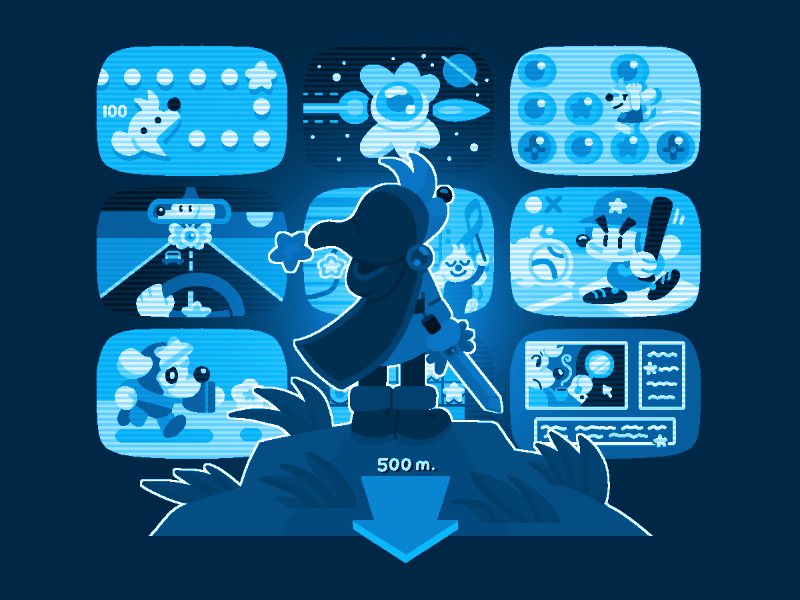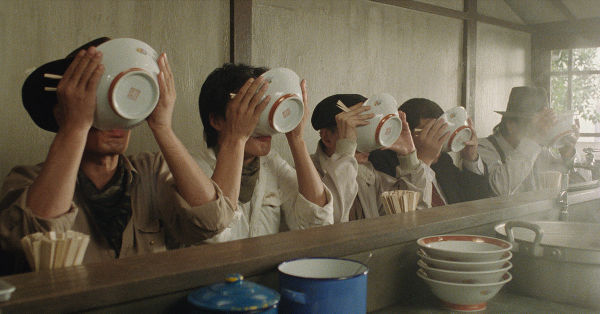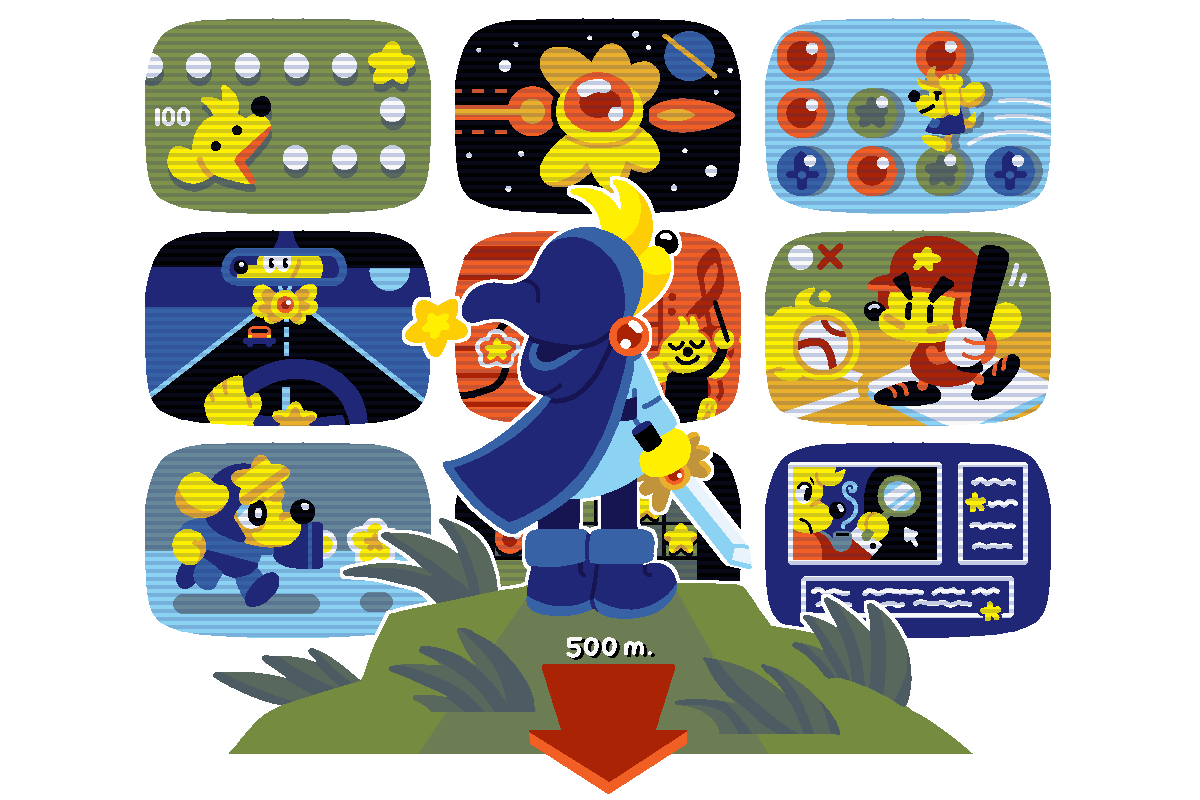Year of the Anthology
- October 08 2024
- 10 min read

Discord and Concord
There’s a lot to be concerned about given the state of the commercial games industry lately. Over 12,000 people have been let go in mass layoffs in 2024 alone. Whole studios are shutting down as their massive parent companies scramble to keep making lines go up, regardless of whether or not their games were successful. And just last month, Concord, a Playstation 5 hero shooter that was 8 years in the making, was shut down and fully refunded after being on the market for only 12 days.
Despite how rancid the overall vibes are, we can learn a lot from Concord’s story. As others have pointed out: it was in development for so long that it felt dated by the time it came out, it was chasing trends from its in inception and entering a market in which competitors were fighting for scraps in an increasingly crowded space, and so much money and time was invested in this game that they needed it to be a huge success from the jump, and on and on. With budgets (and stakes) rising and more stories of troubled productions come to light, what can we do to make sure it doesn’t happen again?
Don’t Read The Novel
Here’s a thought: what if we question the cultural impulse to see bigger or longer games as the default form video games take? In response to NaNoWriMo’s absurd decision to allow the use of LLMs in their submissions (which they’ve since taken down but haven’t totally walked back on), Laura Michet wrote a self-described “deliberately inflammatory” post telling people to not do NaNoWriMo, to not attempt to write a novel, or to even read novels. Why? In a follow-up to better explain her stance, she writes,
“At this point you have to be really obtuse to deny that the push toward novels rather than novellas, short story collections, serial fiction, etc. is the function not only of markets and marketing, but also of a cultural preoccupation with novels and the idea of a novelist stretching back a century. [...] I wrote the other post the way I wrote it because I think a lot of people get trapped in the cultural worship of this specific form of fiction writing. They end up this way not only because of marketing and product design but because there are powerful mentors available all over the world who also valorize this specific type of writing and the writers who create it. We celebrate novelists in a completely unique way. Culturally, they are the person we imagine when someone says "a writer." But you can pay for your apartment and your medicine much more easily doing other types of writing. If you give up trying to be a novelist, you can be so many different things!”
Laura Michet, Cohost
And I really connected with that. I feel like we’re in a moment where the same can be true for video games. Swap out “novels” and “novelists” for “big budget games” and “game workers” and the sentiment still rings true: that, as students and beginners, you’re taught to make small projects to learn the craft. But as soon as you start making your first game or take your first steps in the commercial games industry? Those games are anything but: they’re much larger works, often spanning dozens of hours and a scope way outside what you’ve been used to. And it begs the question, why are larger projects the norm?
As an animation student, I spent four years honing the craft and making short films. Four years to learn the fundamentals and to get a sense of my own pace and abilities. It would seem absurd if, once I graduated, I immediately started planning to make my own feature-length film as an independent creator. Yet it feels like that’s the path a lot of new game developers reflexively choose for their professional careers.
And as Laura Michet’s post reminded me, there are so many different types of games out there. Why do we instinctively reach for the “novels” of video games, as game workers and players? Not every studio can (or should) aspire to produce games on par with blockbuster films… but it seems like that’s an unspoken agreement. The only legitimate games are big, singular works, we all seem to think.
One way to push back against this cultural assumption is to return to producing smaller and shorter games. That also requires more people to buy and play smaller games. Easier said than done, right? Small games on their own have a hard enough time trying to stand out on a storefront amid the latest wave of shiny AAA offerings. Additionally, players might have a hard time making the switch or seeing the “value” of buying and playing shorter games. So then the question becomes how can we encourage players to buy and play smaller games? How can we bridge the gap players and workers face in moving from video game novels to short stories or poetry?
Enter the Anthology
Now I don't know if I have the right to declare 2024 The Year of The Anthology, but it feels like they’re coming back in a big way. This year we’ve been fortunate to see a variety of games do exciting work with the format: Llamasoft: The Jeff Minter Story from Digital Eclipse is a fascinating swerve after The Making of Karateka’s success to highlight the power of documentary-style games on lesser known works and workers in the medium’s history; Anthology of the Killer from thecatamites, which recently won the IGF Nuovo Award, is a stunning narrative experience made up of 9 smaller games from the last 4 years (and now also available on Steam); Locally Sourced Anthology I: A Space Atlas is from a collective of Michigan-based game workers, who together released an anthology of experimental games under a shared theme to better support their local scene; UFO 50, published by Mossmouth of Spelunky fame, is a collection of 50 original retro-inspired small games made for an imaginary console (and is seeing critical and commercial success thanks to their solid core conceit and sustained marketing push); and Indiepocalypse and Indie Tsushin continue to curate (and commission, in the former’s case) small games from various developers to publish as zines regularly to celebrate and support creators outside of mainstream games. Not to mention the rereleases and remasters of older games that steadily come out too...
There are so many different flavours of Anthology available to pick from. And all connected by the simple fact that they’re a selection of works presented together within a collection. Even with such a bare definition, there’s still tremendous potential for the Anthology as a means of getting more short games in front of players and for games to branch out more and experiment.
Try to use the Anthology to show how a single idea evolves and shifts over time. Or use the Anthology to uplift a collective of workers, assembling to raise their voices around a particular theme or issue. Use the Anthology to better document the history of the medium and share the stories of more legends in our field, like Muriel Tramis. You could use the Anthology to tell a story across multiple games as they hop across and blend genres or mechanics. Or you can create an anthology of games sharing the same foundational art assets, story outline, or central gameplay mechanics. Or why not use the Anthology to tell a story of a fictional game worker over a series of “incomplete” games or a “forgotten” catalogue from the annals of history?
“Started playing Live a Live and immediately started thinking about how cool it would be to make an Anthology game where you create a basic battle/conflict resolution system and then hand it over to a handful of different people to create their own short stories with them.
In general, "Game as a collection of short stories" is a concept I really like and would like to do in some way at some point.”
Eric (MOKKOGRAD), Cohost
In our medium, we’ve mostly thought about and released games in isolation, one at a time. Yet there’s so much potential for magic to happen when small games enter into conversations with each other and their players! It’s not like we’d be the first medium to try this either.
In music, songs don’t exist on their own. They’re usually released on albums that have a set sequencing. For musicians, that ordering creates a cohesive whole in the minds of their listeners. Done well, it can even add extra meaning or clever inversions to a song’s text, as well as help the album’s overall flow between tracks. Short story and poetry collections can clue the readers in on what matters most to its writers and how that pursuit may shift or focus over time. In the fine art world, artists and museum curators care deeply about how pieces work in conversation with each other. Film anthologies (and its close relative, hyperlink cinema) have been around for over a century, stitching together smaller stories and letting audiences discover their connecting threads. If given the chance, which new doors could the Anthology open for games?

Tampopoposting
A Way Out
Listen, if game workers want to make full careers out of this and survive in the long-term, and if the people who play video games want to help supporting them, then something needs to be done (aside from collective action among workers or market interventions by platform holders), That, I believe, starts with trending towards smaller games. And Anthologies present a real opportunity for smaller games to stand a chance and pave the way for a healthier and more sustainable field.
It won’t solve every issue, though. How these games are produced is just as important as which games get produced. Working conditions, whether self-imposed or directed by your boss, need to be kept in check. At the very least, with more opportunities to close projects and move on, we can have real, open discussions with other game workers and game players about what these processes look like and how to improve them.
Additionally, it’s not going to be enough to release small games and move on to the next thing. There has to be a system in place that highlights and champions them, whether that’s developers, games media, platforms and storefronts, or players and streamers. Or a combination of all of them. At the very least, talking about small games and playing them is a first step.
And hey. If you and your other game developer friends already have a back-catalogue of small games to bundle together into an Anthology, why not also take the opportunity to add something a little different to the mix? Or use your platform with other established game workers to bring someone new in, to spotlight emerging voices. A game that might have been too risky to release on its own, when bundled with other titles that are more well-known or approachable, is better equipped to find its audience and succeed. Hell, if it wasn’t for The Orange Box, we wouldn’t have gotten Portal:
“Portal was so short because it was a trial. We paired it with [Half-Life 2] Episode 2 and Team Fortress 2, which were recognizable and safe. Then we had this Portal thing, and we had no idea if people would dig it, even though we thought it was a cool idea. So it was put out there safely in the Orange Box, and the results came back wilder than we could have ever imagined.”
Doug Lombardi, Game Informer Issue 204 (April 2010), Page 51
Hopefully, Anthologies can help make smaller games more viable for game workers and players, and can usher in a sea change of perspective for the better. Not overnight, of course, but steadily... one small game at a time.
Thanks for reading! Now that Cohost’s shutting down, this will be my only site for posting. I’ll add an archive page with some of my posts from there next. In the meantime, if you enjoyed this post or want to say hi, please leave a message below or email me!
Looking for more?
- Haunted PS1 continues to put out horror game anthologies and doing exciting stuff with the medium. Horror’s a fascinating genre space to watch if you’ve got the stomach for it!
- The Adamant Gambit is on my to-play list. It’s a collection of ten short slice-of-life games by a group of developers, telling a fractured story about a starship and its crew.
- Michael Klamerus has a post on their blog from 2022 about various indie game anthologies and why they’re great. Go check it out!
- John Thyer has a post called How To Make Good Small Games that’s part manifesto, part guide, on why we should make more small games. It’s a great place to start! And if you’re looking for inspiration from developers of small games who have managed to make it into a living, check out the works of PUNKCAKE Délicieux, SOKOPOP Collective, and sylvie!
Finally, Charlie Davis did an incredible job with this post’s illustration. Here’s the full image they sent (in colour) before I added the blue gradient map. It’s too good not to share. Enjoy!

